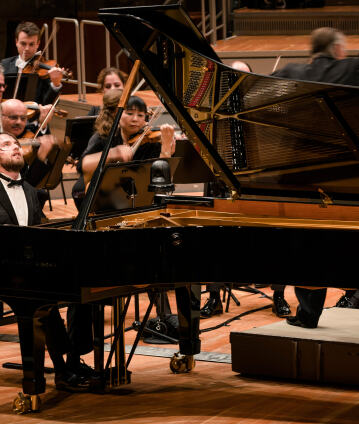Mariss Jansons and Daniil Trifonov with Schumann’s Piano Concerto

In this concert, Mariss Jansons, a celebrated interpreter of the Romantic repertoire, reveals the entire musical and emotional range of this epoch. On the one hand, the wild virtuosity of Schumann’s rapturous Piano Concerto, on the other, the deeply religious grandeur of Bruckner’s Sixth Symphony. The piano soloist is Daniil Trifonov, who combines sensational technique with sensitivity and maturity of expression.
“It’s astonishing to see what a wide range of emotions and ideas there are in of Schumann’s musical language,” says Daniil Trifonov. The Russian pianist, who made his dazzling orchestral debut with the Berliner Philharmoniker playing Rachmaninov’s Third Piano Concerto at the 2016 New Year’s Eve Concert, is now the soloist in Robert Schumann’s Piano Concerto in A minor. With this work, the composer wanted to create a counter-proposal to the virtuoso concertos of his time which depended solely on technical brilliance. He envisioned a “cross between a symphony, concerto and grand sonata”.
What is special and new about this piece is how Schumann derives all themes and motifs from the main idea of the first movement. The composer had originally conceived this movement as a fantasy for piano and orchestra, and – because no publisher was interested in this form – later expanded it to a three-movement concerto. The close relationship between soloist and orchestra was also unusual for the time. “The piano is interwoven with the orchestra in the most delicate way – one can’t imagine the one without the other,” said Schumann’s wife Clara, who was the soloist not only for the world premiere in Dresden in 1845, but also for her first appearance with the Berliner Philharmoniker in February 1883.
At almost the same time, the two middle movements, the Adagio and Scherzo, of Anton Bruckner’s Sixth Symphony also received their first public performance at the Vienna Musikvereinssaal, conducted by Wilhelm Jahn – with considerable success. A performance of the complete symphony, described by the composer himself as his “boldest”, did not take place until three years after the composer’s death with Gustav Mahler as the conductor. Unlike in the previous Fifth, which culminates in a large-scale, contrapuntal finale, Bruckner here moved the focus to the first movement, which first establishes an almost Morse code-like rhythm above which the three themes of the movement emerge. From the outset, Bruckner makes it clear where the tension in this symphony originates: in the conflict between duple and triple meter. This conflict runs through the solemn, sublime Adagio and the eerie Scherzo to the finale, which thematically reflects back on the opening movement. The work is conducted by Mariss Jansons, someone who has been associated artistically with the Berliner Philharmoniker for many years. However, this will be the first occasion he and the orchestra perform a work by Bruckner together.
© 2018 Berlin Phil Media GmbH
Related interviews